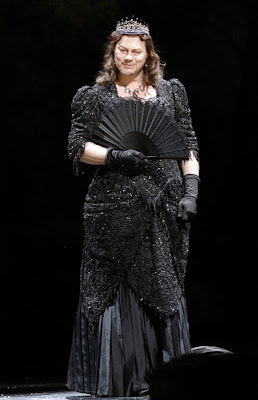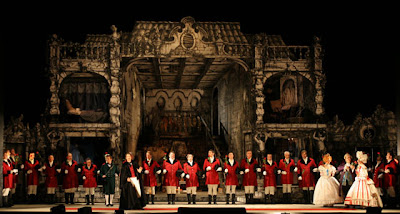(in English below)
Considerada uma evolução da Grand Opéra, mantém a estrutura em cinco actos, o bailado e os coros, mas centra-se mais na componente vocal, com grande ênfase nas personagens principais. A ópera tem tido grande sucesso desde que foi estreada e contém momentos musicais de apreciável riqueza melódica. Vocalmente é muito marcante, com árias imponentes de baixo (Le véu d’or de Méphistophélès é um bom exemplo), árias de tenor de grande doçura lírica (como é o caso da famosa ária de Faust Salut, demeure chaste et pure), árias de expressiva coloratura do soprano (Ah! Je ris de me voir de Marguerite), duetos de intensidade romântica assinalável, outros ensembles memoráveis e intervenções notáveis do coro (Glorie immortelle de nos aieux pelo coro dos soldados).
(fotografia de Catherine Ashmore / Royal Opera House)
A encenação de David McVicar é vistosa e rica, com cenários sombrios próprios do ambiente da ópera. A personagem tratada de forma mais sofisticada é Méphistophélès, que assume múltiplas personalidades, incluindo de mulher (e René Pape vestido de mulher é verdadeiramente o diabo de saias). A descida ao inferno, reino de Méphistophélès, é ao próprio teatro de ópera, outra imagem metafórica bem conseguida. As partes que menos gostei foram os bailados. Um, uma “pseudo Giselle” com as bailarinas descalças, uma delas grávida, que acaba a levar pontapés de todas as outras. O outro, perto do final, começa inocentemente e acaba numa cena origática de gosto duvidoso.
(fotografia de Catherine Ashmore / Royal Opera House)
O elenco dos cantores era verdadeiramente estrelar e não desiludiu:
Faust foi interpretado pelo jovem tenor italiano Vittorio Grigolo. Vi-o pela primeira vez ao vivo no ano passado, na Manon e logo fiquei muito bem impressionado. Desempenhou o papel com grande eficácia. A sua juventude, boa figura e grande agilidade ajudam muito. A energia é transbordante e a voz de tenor lírico é potente e viril. Sobe aos agudos com facilidade e mantém-nos com elevada qualidade. Conseguiu transmitir paixão nos duetos com Marguerite e desespero na cena final. Apesar de o francês não lhe sair com naturalidade, foi uma excelente interpretação, vocal e cénica. Na récita que assisti foi, dos cantores masculinos, o mais ovacionado.
(fotografia de Catherine Ashmore / Royal Opera House)
(fotografia de Catherine Ashmore / Royal Opera House)
Seguramente que a cantou muito melhor que a Castafiore de Tintin (figura de Hergé em “As Jóias da Castafiore” inspirada nesta ária) e não partiria os vidros que estivessem por perto.
À medida que o espectáculo avançava, assim acontecia também com a qualidade do desempenho da Gheorghiu. A cena da loucura foi marcante e a cantora alcançou mais um êxito memorável. Fantástica.
(fotografia de Catherine Ashmore / Royal Opera House)
(fotografia de Catherine Ashmore / Royal Opera House)
Começou de forma excelente a minha temporada de 2011-2012!
*****
Charles Gounod's Faust is a lyric opera in five acts with libretto by Jules Barbier and Michel Carré based on Carré’s Faust et Marguerite, based on Goethe's Faust. However, it is far from the brilliant work of Goethe, and in the Germanic countries, to highlight the difference, the opera is referred to as Margarethe.
Considered an evolution of the Grand Opéra it maintains the structure in five acts, ballet and chorus, but focuses more on the vocal part, with great emphasis on the main characters. The opera has had great success since it was premiered and contains musical moments of great melodic richness. Vocally it is very striking, with imposing arias of the bass (Le véu d'or by Méphistophélès is a good example), great tenor arias of lyrical sweetness (as in the case of the famous aria from Faust Salut, demeure chaste et pure), arias of expressive coloratura soprano (Ah! Je ris me voir by Marguerite), romantic duets of remarkable intensity, iand other memorable ensembles and great chorus moments (Glorie immortellede nos aieux by the soldiers choir).
Considered an evolution of the Grand Opéra it maintains the structure in five acts, ballet and chorus, but focuses more on the vocal part, with great emphasis on the main characters. The opera has had great success since it was premiered and contains musical moments of great melodic richness. Vocally it is very striking, with imposing arias of the bass (Le véu d'or by Méphistophélès is a good example), great tenor arias of lyrical sweetness (as in the case of the famous aria from Faust Salut, demeure chaste et pure), arias of expressive coloratura soprano (Ah! Je ris me voir by Marguerite), romantic duets of remarkable intensity, iand other memorable ensembles and great chorus moments (Glorie immortellede nos aieux by the soldiers choir).
Dr. Faust old and tired, thinks about suicide, admitting that God will not bring him back youth and love. He invokes the devil and Méphistophélès appears. He promises him glory, wealth and power in exchange for his soul. After having a vision of Marguerite, he accepts the pact. Valentin will go to war and asks his friends to protect his sister Marguerite. Méphistophélès appears, makes predictions, is recognized as the devil and disarms them. Faust tries to get closer to Marguerite but she repels him. Faust dreams of love. Méphistophélès gives Marguerite a jewelry box. She is delighted and ultimately accepts the love of Faust. She goes to church to pray for Faust and fo her son (she is pregnant) but Méphistophélès appears. Valentin returns victorious from war, and seeks Faust to avenge her sister, but he is mortally wounded by him. Before his death, he curses his sister. Marguerite is imprisoned for killing her own son. Faust, in prison, declares his love again and convinces her to run away together. Mephistopheles appears, Marguerite dies and Faust and is taken by him.
The staging by David McVicar is flamboyant and rich, offering grim scenarios adequate to the opera's environment. The character dealt with more detail is Mephistopheles, who takes on multiple personalities, including a woman (and René Pape dressed as a woman is truly the devil in skirts). The descent into hell, the kingdom of Mephistopheles
The Royal Opera Orchestra was conducted by Maestro Evelino Pidó. His conducting was not perfect. Too slow at first, he later improved, but there were many small disencounters, both among the musicians, and between them and the singers. Nothing serious, but far from the usual perfection of this orchestra. The Royal Opera Chorus, however, was magnificent.
The star cast of singers did not disappoint:
Faust was interpreted by the young Italian tenor Vittorio Grigolo. I saw him live for the first time last year, in Manon, and I was very positively impressed. He interpreted the role with great effectiveness. His youth, good looks and great agility help much. The energy is overwhelming and his lyrical tenor voice is powerful and virile. He reaches the top notes with ease and keeps them with high quality. He was able to express passion in the duets with Marguerite and despair in the final scene. Although the French did not come out naturally, it was an excellent performance, vocal and artistic. He was the most applauded among male singers.
The star cast of singers did not disappoint:
Faust was interpreted by the young Italian tenor Vittorio Grigolo. I saw him live for the first time last year, in Manon, and I was very positively impressed. He interpreted the role with great effectiveness. His youth, good looks and great agility help much. The energy is overwhelming and his lyrical tenor voice is powerful and virile. He reaches the top notes with ease and keeps them with high quality. He was able to express passion in the duets with Marguerite and despair in the final scene. Although the French did not come out naturally, it was an excellent performance, vocal and artistic. He was the most applauded among male singers.
René Pape, German bass, was a remarkable Méphistophélès. He has a full bass voice, very powerful and with subtle color changes that are perfectly adapted to the role. He was truly evil and cynical, a frightening creature. His figure helps a lot and the staging too. In the aria Le véu d'or he was blameless and, whenever his malefic presence appeared, he did so with unsurpassed mastery. Excellent.
Romanian soprano Angela Gheorghiu was a fantastic Marguerite. Her voice keeps a beautiful velvety tone. She never screams and she makes herself heard impressively when she sings in forte. In the aria Ah! Je ris me voir, the famous aria of the jewels, despite the high quality of singing, the coloratura was not overwhelming, but the softness of vocal beauty was remarkable.
Surely she sang much better than Tintin´s Castafiore (Hergé figure in "The Jewels of Castafiore" inspired in this aria) and she would not break glasses that were around.
As the show progressed, so did also the quality of Gheorghiu's performanc . The mad scene was remarkable and the singer hit another memorable success. Fantastic.
Surely she sang much better than Tintin´s Castafiore (Hergé figure in "The Jewels of Castafiore" inspired in this aria) and she would not break glasses that were around.
As the show progressed, so did also the quality of Gheorghiu's performanc . The mad scene was remarkable and the singer hit another memorable success. Fantastic.
Valentin, Marguerite's brother, was interpreted by Russian baritone Dmitri Hvorostovsky. The interpretive quality of this singer, artistic and vocal, is fabulous. The baritonal voice is of an unusual beauty, surely one of the best that can be heard today. He has a fantastic technique and he is able to project his voice with remarkable efficiency, always conveying a sense of softness. He is another singer I've heard several times and he never disappoints. To me, he was the best male voice of the evening.
I am very curious about this opera because I expect to see four presentations of Faust in different places over the next three months.
It was another great opera at the Royal Opera House
*****
I am very curious about this opera because I expect to see four presentations of Faust in different places over the next three months.
It was another great opera at the Royal Opera House
*****












































